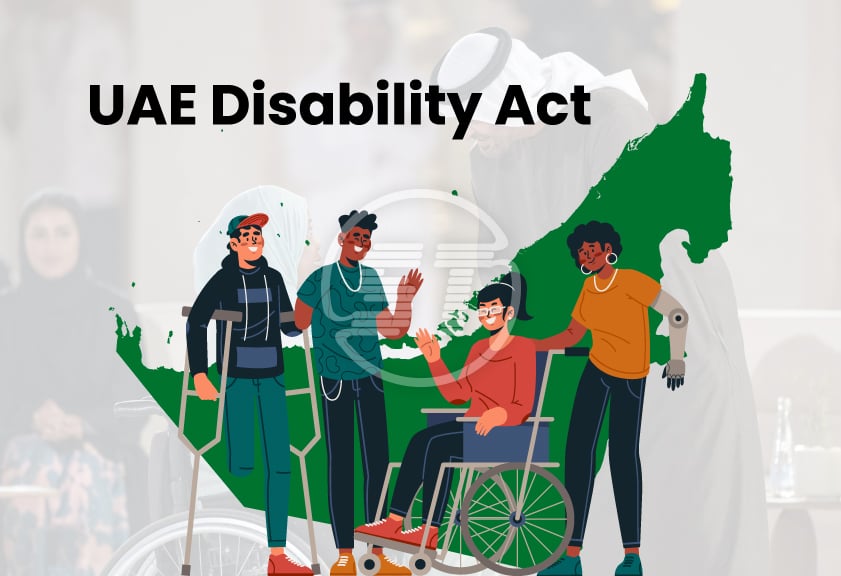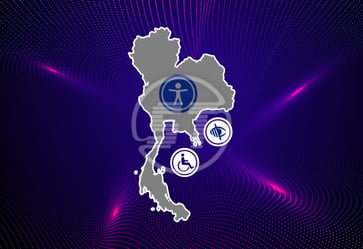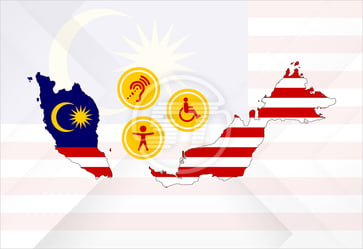The UAE Disability Act has paved the way for individuals with disabilities to access education, employment, and public services.
The United Arab Emirates (UAE) has taken significant strides towards inclusivity and accessibility, specifically for individuals with disabilities. The UAE Disability Act is a landmark piece of legislation because it outlines the rights and protections afforded to people with disabilities, ensuring a more equitable society.
Overview of the UAE Disability Act
The UAE Disability Act, officially known as Federal Law No. 29 of 2006, emphasizes the rights of people with disabilities to access all basic and important public services, education, and employment opportunities. Over the years, this law has been expanded and updated to include digital accessibility, reflecting the growing importance of online platforms in everyday life.
This legislative framework aligns with international standards, particularly the Web Content Accessibility Guidelines (WCAG), to ensure that websites and mobile applications cater to users with various disabilities, including visual, auditory, cognitive, and motor impairments.
Highlights of UAE Disability Act: Mandates to understand!
- Compliance with WCAG principles
The UAE Disability Act has adopted the WCAG 2.1 level AA standards as a benchmark for digital accessibility. These principles are designed to ensure that websites are perceivable, operable, understandable, and robust.
- Arabic language support
Accessibility standards in the UAE prioritize bilingual support, particularly in Arabic, to cater to the country’s diverse population.
- Support for assistive technologies
Websites are required to work seamlessly with screen readers, voice recognition tools, and other assistive technologies, empowering individuals with visual and motor impairments.
- Accessible multimedia content
Videos and audio content must include captions, transcripts, and audio descriptions to ensure they are accessible to users with hearing or visual impairments.
- Custom user experience
Users should be able to adjust font sizes, contrast settings, and other visual elements to suit their individual needs. Keyboard-only navigation is also required thereby people with motor issues can access websites and navigate through.
- Accessible multimedia content
Videos and audio content must include captions, transcripts, and audio descriptions to ensure they are accessible to users with hearing or visual impairments.
- Custom user experience
Users should be able to adjust font sizes, contrast settings, and other visual elements to suit their individual needs. Keyboard-only navigation is also required thereby people with motor issues can access websites and navigate through.
- Straightforward navigation for digital portals
All government entities ought to facilitate access to information and services by classifying the digital content based on specific topics. It gives a streamlined and faster navigation to users.
- Text to sign language translation
Sign language translation is mandatory on government websites to offer accessible digital products and services for people with hearing challenges.
- Accessibility statement
Government and federal entities are required to publish their accessibility statement including all the mandatory details. Declaration of exceptions (if any) should be mentioned in the accessibility statement along with amendments and updates.
Create your website's accessibility statement effortlessly with our Accessibility Statement Generator!
- Enforcement and compliance
All government entities must furnish essential accessibility reports to the Competent Authority about the implementation of the UAE Disability Act.
Annual or semi-annual compliance updates are important based on the data of the Competent Authority.
The team from the Competent Authority concerned is entitled to measure the website’s indicators periodically to achieve specified accessibility targets.
- Amendments to the policy
The accessibility policy/act receives periodic updates. Thus, government entities must notice the updates, terms and conditions to keep their digital assets compliant. The updated guidelines are published on the “New Update” section of the Competent Authority’s website and are effective immediately after publication. Also, the Competent Authority has the right to cancel or replace the guidelines at any time.
Read more about UAE Disability Act.
Empowering a digitally inclusive future!
The UAE’s efforts to enforce website accessibility standards (UAE Disability Act) reflect its vision of a digitally inclusive society. By empowering organizations to create accessible digital platforms, the nation is not only fulfilling its commitment to people with disabilities but also setting an example for the global community.
As the UAE continues to innovate in accessibility, businesses and public institutions must embrace these standards to ensure their digital presence is inclusive, user-friendly, and compliant with the law. Together, these efforts bridge the gap and create a new way for a more equitable and accessible digital future for all.
Improve digital inclusivity with All in One Accessibility®!
Complying with the UAE Disability Act is essential for creating an inclusive online experience for everyone. With the All in One Accessibility®, you can easily enhance website's accessibility and meet the required standards. Our powerful, user-friendly solution is designed to help businesses provide equal access to their digital platforms. Take the first step towards empowering digital inclusivity - integrate All in One Accessibility® today!
The UAE Disability Act sets important guidelines for website accessibility, and staying compliant is crucial for businesses operating in the region. At Skynet Technologies, we provide expert solutions to help you navigate these standards, enhancing website accessibility among all users. Let us assist you in creating an inclusive digital experience that meets legal requirements and enhances user engagement. Reach out hello@skynettechnologies.com for more information.


